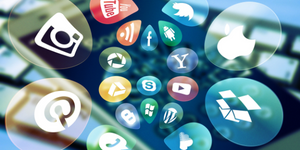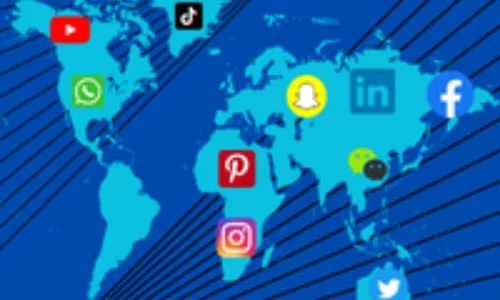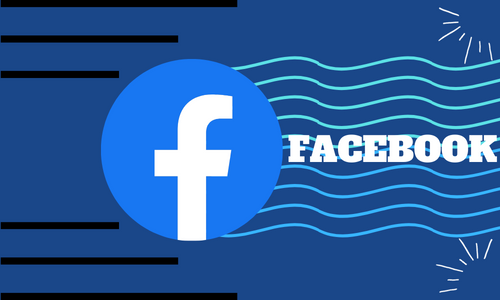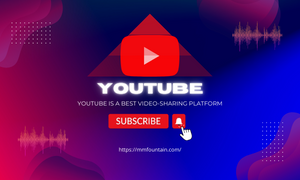Social Media Defination & Types
Social Media Defination
Top 10 most popular social media platforms
The top 10 most popular social media platforms are
- YouTube
- TikTok
- Snapchat
These platforms have billions of active users worldwide and play a significant role in shaping our online experiences, connecting us with others, and sharing information and entertainment. Each platform offers unique features and appeals to different demographics, making it important for businesses and individuals to understand the strengths and weaknesses of each.
Facebook is a social networking site that was launched in 2004 and has since become one of the largest and most influential platforms in the world. With over 2.8 billion monthly active users as of 2023, Facebook has become a dominant force in online communication and a powerful tool for connecting people and businesses.
Users on Facebook can create personal profiles, add friends, share updates, and engage with others by commenting and liking posts. The platform also allows businesses and organizations to create pages to promote their products or services and connect with customers. Facebook’s algorithm-driven news feed serves up content based on users’ interests and preferences, making it an effective tool for targeted advertising.
In addition to its core features, Facebook has also launched a range of other products and services, including the instant messaging app WhatsApp, the virtual reality platform Oculus, and the photo-sharing app Instagram. The company has faced criticism for its handling of user data and privacy, as well as its role in spreading misinformation and fueling political polarization.
Despite these challenges, Facebook is still one of the most popular and significant social media platforms globally. Its massive user base, sophisticated advertising capabilities, and constantly evolving feature set make it an essential tool for businesses, organizations, and individuals alike.
YouTube
YouTube is a video-sharing platform that has become one of the most popular and influential social media sites in the world. Launched in 2005, YouTube now has over 2 billion monthly active users and has become a hub for sharing and discovering video content, from music videos and movies to cooking tutorials and viral memes.
Users on YouTube can upload their own videos, comment on and like videos from other users, subscribe to channels, and create playlists. The platform’s recommendation algorithms serve up videos based on users’ interests and preferences, making it easy to discover new and engaging content.
In addition to hosting user-generated content, YouTube has also become a platform for professional content creators, with many YouTube stars earning millions of dollars through advertising revenue and brand partnerships. The platform has also become a powerful tool for businesses and organizations, offering a way to reach a massive global audience and engage with customers in new and innovative ways.
Despite its massive popularity, YouTube has faced criticism for its handling of sensitive and controversial content, as well as its role in spreading misinformation and fostering extremist views. The company has implemented policies and tools to address these concerns, but balancing free speech with responsible content moderation remains a major challenge.
Despite these challenges, YouTube remains one of the most popular and influential social media platforms in the world. Its massive user base, diverse content offerings, and constantly evolving feature set make it an essential tool for businesses, organizations, and individuals alike.
WhatsApp is a popular instant messaging app that was launched in 2009 and acquired by Facebook in 2014. With over 2 billion monthly active users, WhatsApp has become one of the largest and most widely used communication tools in the world.
WhatsApp allows users to send messages, make voice and video calls, share photos and videos, and more, all in real-time and encrypted end-to-end for added security. The app is available for free on both smartphones and computers, and can be used for personal and business communication alike.
WhatsApp has revolutionized the way people communicate, offering a fast and convenient way to stay in touch with friends, family, and colleagues, regardless of location. The app has also become an important tool for businesses, offering a way to reach customers and provide support through messaging, voice and video calls, and automated responses.
Despite its popularity, WhatsApp has faced criticism for its handling of user data and privacy, as well as its role in spreading misinformation and fueling political polarization. The company has implemented measures to address these concerns, but balancing security with ease of use remains a major challenge.
Despite these challenges, WhatsApp remains one of the most widely used and popular instant messaging apps in the world. Its simple interface, powerful features, and secure encryption make it an essential tool for communication and business.
Instagram is a photo and video-sharing social media platform that was launched in 2010 and has since become one of the most popular and influential social media sites in the world. With over 1 billion monthly active users, Instagram has become a hub for sharing and discovering visual content, from beautiful travel photography to eye-catching fashion and beauty shots.
Users on Instagram can post photos and videos, add filters and effects, and engage with others by commenting and liking posts. The platform’s algorithm-driven feed serves up content based on users’ interests and preferences, making it easy to discover new and inspiring content.
In addition to its core features, Instagram has also launched a range of other tools and products, including the shopping feature, which allows businesses to sell products directly on the platform, and the stories feature, which allows users to share ephemeral photos and videos that disappear after 24 hours.
Instagram has become a powerful tool for businesses and organizations, offering a way to reach a massive global audience and engage with customers in new and innovative ways. The platform has also become a hub for influencer marketing, with many social media stars earning millions of dollars through brand partnerships and sponsored posts.
Despite its massive popularity, Instagram has faced criticism for its impact on body image and mental health, as well as its role in spreading misinformation and fostering political polarization. The company has implemented measures to address these concerns, but balancing free expression with responsible content moderation remains a major challenge.
Despite these challenges, Instagram remains one of the most popular and influential social media platforms in the world. Its beautiful visual content, innovative features, and massive user base make it an essential tool for businesses, organizations, and individuals alike.
TikTok
TikTok is a social media platform that allows users to create and share short-form videos, ranging from 15 to 60 seconds in length. Launched in 2016, the app has become one of the most popular and influential social media sites in the world, with over 1 billion monthly active users.
TikTok’s algorithm-driven “For You” page serves up content based on users’ interests and preferences, making it easy to discover new and engaging videos. The platform has also become a hub for music and dance trends, with many viral songs and dances originating on the app.
TikTok has become a powerful tool for individuals and businesses alike, offering a way to reach a massive global audience and engage with customers in new and innovative ways. The platform has also become a hub for influencer marketing, with many social media stars earning millions of dollars through brand partnerships and sponsored content.
Despite its massive popularity, TikTok has faced criticism for its handling of user data and privacy, as well as its role in spreading misinformation and political propaganda. The company has implemented measures to address these concerns, but balancing security with ease of use remains a major challenge.
Despite these challenges, TikTok remains one of the most popular and influential social media platforms in the world. Its innovative features, massive user base, and unique video content make it an essential tool for businesses, organizations, and individuals looking to engage with a young, tech-savvy audience.
Twitter is a popular microblogging social media platform that was launched in 2006 and has since become a hub for real-time news, information, and communication. With over 330 million monthly active users, Twitter has become an essential tool for journalists, politicians, businesses, and individuals alike.
Users on Twitter can post short messages, known as tweets, of up to 280 characters, engage with others by commenting and retweeting, and follow others to create a customized feed of content. The platform’s trending topics and hashtags make it easy to discover new and engaging content and to join in on conversations about current events and popular topics.
In addition to its core features, Twitter has also launched a range of other tools and products, including Twitter ads, which allow businesses to reach a targeted audience and promote their products and services, and Twitter Moments, which curate tweets about specific topics and events.
Twitter has become a powerful tool for businesses and organizations, offering a way to reach a massive global audience and engage with customers in real-time. The platform has also become a hub for political discourse and social justice movements, with many users using the platform to raise awareness about important issues and to advocate for change.
Despite its massive popularity, Twitter has faced criticism for its handling of sensitive and controversial content, as well as its role in spreading misinformation and fostering political polarization. The company has implemented measures to address these concerns, but balancing free speech with responsible content moderation remains a major challenge.
Despite these challenges, Twitter remains one of the most influential and important social media platforms in the world. Its real-time news and information, innovative features, and massive user base make it an essential tool for businesses, organizations, and individuals alike.
WeChat is a social media app developed by Chinese tech giant Tencent. Launched in 2011, WeChat has become one of the largest social media platforms in China, with over 1.2 billion monthly active users.
WeChat is more than just a social media platform – it’s a “super app” that allows users to do everything from messaging and voice calls to mobile payments and online shopping. The app’s powerful features and convenience have made it an essential tool for both personal and business communication in China.
In addition to its core features, WeChat also offers a range of other tools and services, including WeChat Pay, which allows users to pay for goods and services through the app, and WeChat Work, a business communication platform that allows companies to communicate and collaborate with employees and customers.
Despite its popularity in China, WeChat has faced criticism for its censorship and handling of user data, particularly with regards to Chinese government surveillance. The company has implemented measures to address these concerns, but privacy and censorship remain major issues for the platform.
Despite these challenges, WeChat remains a powerful tool for communication and commerce in China. Its “super app” features, massive user base, and convenience have made it an essential part of daily life for millions of people in China and beyond.
Pinterest is a visual discovery and bookmarking platform that was launched in 2010. With over 400 million monthly active users, Pinterest has become a popular social media site for discovering and sharing ideas, inspirations and interests through visual content.
Users on Pinterest can create virtual “boards” and “pins” by saving images or videos from the web, as well as browse through others’ pins and boards. Pinterest’s powerful search algorithms provide personalized recommendations, making it easy to discover new content related to users’ interests.
Pinterest has become a hub for sharing and discovering a wide range of topics, from fashion, home decor, and food to travel and lifestyle. The platform has also become an important tool for businesses, offering a way to reach a massive audience and engage with customers in new and innovative ways.
Pinterest has also taken steps to address user privacy and security concerns, such as implementing two-factor authentication and providing users with greater control over their data.
Despite its massive popularity, Pinterest has faced criticism for its role in perpetuating unattainable beauty standards and for its handling of misinformation and extremist content. The company has implemented policies and tools to address these concerns, but balancing free expression with responsible content moderation remains a major challenge.
Despite these challenges, Pinterest remains a popular and influential social media platform for discovering and sharing ideas and interests. Its visually appealing content, personalized recommendations, and innovative features make it an essential tool for individuals and businesses alike.
Snapchat
Snapchat is a multimedia messaging app launched in 2011 that allows users to share photos and videos that disappear after being viewed. With over 280 million monthly active users, Snapchat has become a popular social media platform, particularly among younger audiences.
Snapchat’s key feature is its “Stories” feature, where users can share a sequence of photos and videos with their friends that disappear after 24 hours. Snapchat also offers “Snap Map,” a feature that allows users to see their friends’ locations on a map.
Snapchat has evolved into a powerful tool for businesses, with brands using the platform to create engaging content and reach younger audiences. Snapchat offers a range of ad formats, including sponsored filters, lenses, and geofilters, as well as the opportunity to collaborate with influencers to promote products and services.
Despite its popularity, Snapchat has faced criticism for its role in promoting unrealistic beauty standards and for its handling of user data privacy. The company has implemented measures to address these concerns, such as increasing user control over privacy settings and launching tools to promote digital wellbeing.
In recent years, Snapchat has expanded its offerings beyond messaging, introducing new features such as “Spotlight,” a feed of user-generated short-form videos, and “Snap Originals,” exclusive shows produced by the company.
Despite the challenges, Snapchat remains a popular social media platform, with its unique features and young user base making it a valuable tool for businesses looking to engage with younger audiences. Its focus on privacy and digital wellbeing, as well as its innovative features, make it a standout in the crowded social media landscape.
LinkedIn is a professional networking platform launched in 2003 that allows users to create a profile highlighting their professional experience, skills, and education. With over 740 million members, LinkedIn has become a popular social media site for professionals to connect and engage with others in their industry.
LinkedIn’s key features include the ability to search for jobs and network with other professionals, as well as the ability to publish and share content related to industry trends and best practices. The platform has also become a valuable tool for businesses, offering a way to recruit new talent, promote their brand, and engage with customers.
LinkedIn has taken steps to address user privacy and security concerns, such as offering two-factor authentication and providing users with greater control over their data. The platform has also implemented measures to combat misinformation and hate speech.
Despite its popularity, LinkedIn has faced criticism for its limited user engagement and for its tendency to prioritize certain types of content over others. The company has implemented changes to its algorithm and platform design to address these concerns, but balancing the needs of users and businesses remains a major challenge.
Despite these challenges, LinkedIn remains a valuable tool for professionals looking to network and connect with others in their industry. Its focus on professional development and career advancement, as well as its broad user base and business-focused features, make it a standout in the social media landscape.












